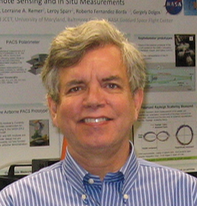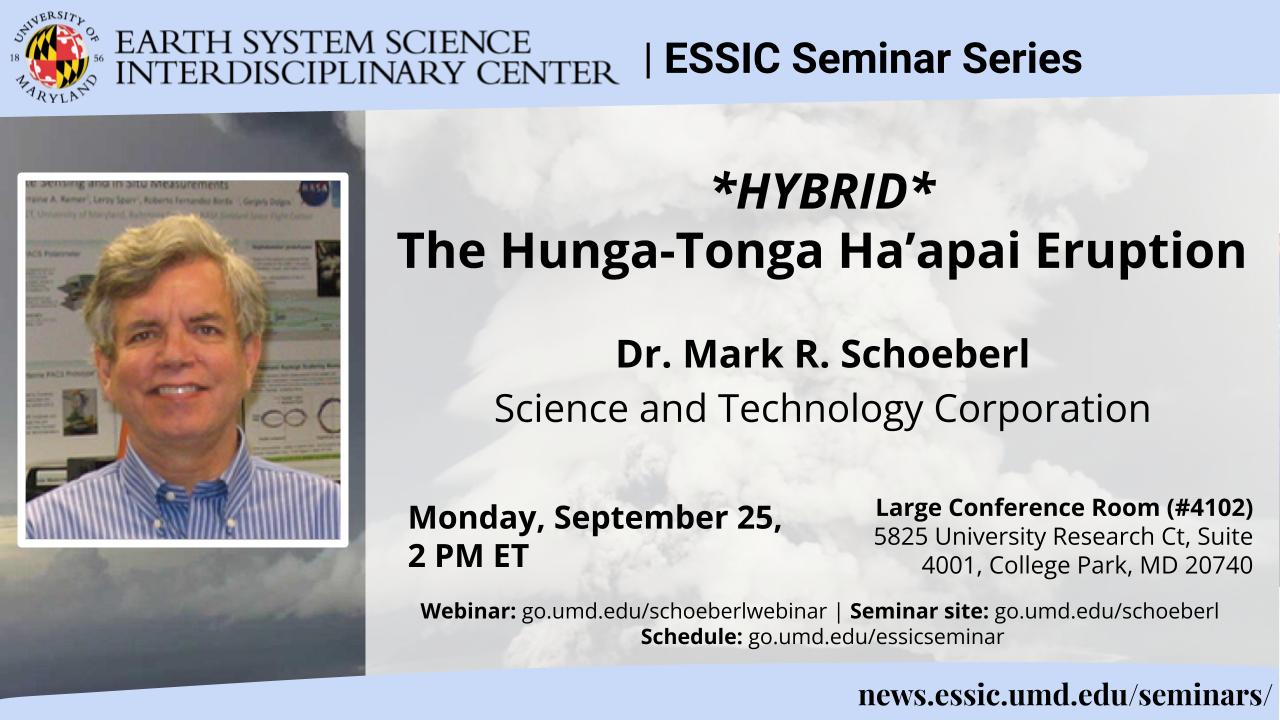
The Hunga-Tonga Ha’apai Eruption
This event has passed. See the seminar recording here:

Dr. Mark R. Schoeberl
Science and Technology Corporation
Monday September 25, 2023, 2 PM ET
Abstract:
The Jan. 15, 2022 Hunga-Tonga Ha’apai eruption was the most powerful since Krakatau (1883) and erupted material reached the upper stratosphere and lower mesosphere. This talk reviews the impact of the eruption on stratosphere and the evolution of constituents following the eruption. The talk has three parts: the eruption characteristics, the transport of Hunga-Tonga constituents for the year following the eruption, and the potential climate impact of the eruption. Of special interest is the large amount of water vapor lofted into the stratosphere which was unprecedented. This single eruption increased the total stratospheric water vapor by ~10%, and as of mid-2023 much of the Hunga-Tonga water vapor is still present in the stratosphere. Also unprecedented is the low amount of SO2 expelled by the eruption. Oxidation of SO2 forms sulfate aerosols. The global average Hunga-Tonga aerosol optical depth only reached 0.02, much smaller than observed for Pinatubo (~0.2). Following the eruption, the stratospheric spread of water vapor and aerosols was influenced by the quasi-biennial oscillation which mostly isolated the eruption plume to the southern hemisphere. Finally, we show that the Hunga-Tonga stratospheric water vapor produced an enhanced downward radiative flux, but this flux was countered by the aerosol-driven reduction in direct solar forcing. As a result, the surface temperature impact of the Hunga-Tonga eruption will be very small.
Biosketch:
Dr. Mark Schoeberl is Chief Scientist of Science and Technology. He specializes in stratospheric processes including wave dynamics, ozone depletion. cloud physics, and trace gas transport. He has over 241 refereed publications, over 17,703 citations in atmospheric science journals (Hirsch Index 68) and one patent. He retired from NASA Goddard in 2009. He was previously the EOS Aura and Upper Atmosphere Research Satellite Project Scientist. He is a Fellow of the American Geophysical Union (1996), the American Association for the Advancement of Science (1996), and the American Meteorological Society (1996). He was awarded Goddard’s William Nordberg Memorial Award for Earth Sciences (1998), NASA’s Exceptional Scientific Achievement Medal (1991), NASA’s Outstanding Leadership Medal (1996) and Distinguished Service Award (2000). He has received the William T. Pecora award 3 times and 13 NASA Group Achievement awards. Dr. Schoeberl received a B.S. in Physics from Iowa State University in 1970 and received his Ph.D. in Physics from the University of Illinois in 1976. He grew up in Davenport, Iowa.
Webinar:
Event site: https://go.umd.edu/schoeberl
Zoom Webinar: https://go.umd.edu/schoeberlwebinar
Zoom Meeting ID: 950 3516 0147
Zoom password: essic
US Toll: +13017158592
Global call-in numbers: https://umd.zoom.us/u/aMElEpvNu
For IT assistance:
Cazzy Medley: cazzy@umd.edu
Resources:
Seminar schedule & archive: https://go.umd.edu/essicseminar
Seminar Google calendar: https://go.umd.edu/essicseminarcalendar
Seminar recordings on Youtube: https://www.youtube.com/user/ESSICUMD
